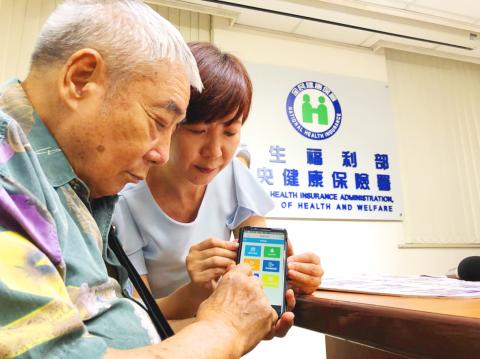More than 920,000 people have registered to use the “My Health Bank” service and there are plans to expand the service to allow direct blood relatives to check the medical history of family members in March, the National Health Insurance Administration (NHIA) said.
Launched in September 2014, the My Health Bank service allows people with National Health Insurance (NHI) to register for an account on the online system and view their own medical history.
The information that users can look up in their account includes their inpatient, outpatient and dental records in the past three years, vaccinations, allergic reactions and prescribed drug use records and examination reports, organ donation or hospice care preferences, and reminders about their next recommended health checkup.

Photo: CNA
My Health Bank users can also insert their height, weight, blood pressure and other measurements to keep track of their own health.
NHIA Director-General Lee Po-chang (李伯璋) on Tuesday said that more than 920,000 people have registered to use the service so far and demographics showed that 46 percent of users are aged between 31 and 50, 53 percent are married, 55 percent are female and 74 percent live in urban areas.
Asked to share his experiences of using the service, entertainer Alvin Hou (侯昌明) said he is often busy working and would forget about the illnesses he has had, so logging into his My Health Bank account allows him to clearly understand his medical history.
He said his father has dementia, chronic hypertension and diabetes, and needs repeated prescriptions, but he had sometimes forgotten to collect the prescriptions due to his busy work schedule, so the service helps to remind him.
The NHIA plans to expand the service for users to also check their parents’ or children’s medical records using their own account in March.
Many middle-aged people have busy work schedules, while having to take care of their elderly parents and children at the same time, so the expanded service is expected to help them manage their family members’ health more easily, Lee said.

Taiwan is stepping up plans to create self-sufficient supply chains for combat drones and increase foreign orders from the US to counter China’s numerical superiority, a defense official said on Saturday. Commenting on condition of anonymity, the official said the nation’s armed forces are in agreement with US Admiral Samuel Paparo’s assessment that Taiwan’s military must be prepared to turn the nation’s waters into a “hellscape” for the Chinese People’s Liberation Army (PLA). Paparo, the commander of the US Indo-Pacific Command, reiterated the concept during a Congressional hearing in Washington on Wednesday. He first coined the term in a security conference last

A magnitude 4.3 earthquake struck eastern Taiwan's Hualien County at 8:31am today, according to the Central Weather Administration (CWA). The epicenter of the temblor was located in Hualien County, about 70.3 kilometers south southwest of Hualien County Hall, at a depth of 23.2km, according to the administration. There were no immediate reports of damage resulting from the quake. The earthquake's intensity, which gauges the actual effect of a temblor, was highest in Taitung County, where it measured 3 on Taiwan's 7-tier intensity scale. The quake also measured an intensity of 2 in Hualien and Nantou counties, the CWA said.

The Overseas Community Affairs Council (OCAC) yesterday announced a fundraising campaign to support survivors of the magnitude 7.7 earthquake that struck Myanmar on March 28, with two prayer events scheduled in Taipei and Taichung later this week. “While initial rescue operations have concluded [in Myanmar], many survivors are now facing increasingly difficult living conditions,” OCAC Minister Hsu Chia-ching (徐佳青) told a news conference in Taipei. The fundraising campaign, which runs through May 31, is focused on supporting the reconstruction of damaged overseas compatriot schools, assisting students from Myanmar in Taiwan, and providing essential items, such as drinking water, food and medical supplies,

New Party Deputy Secretary-General You Chih-pin (游智彬) this morning went to the National Immigration Agency (NIA) to “turn himself in” after being notified that he had failed to provide proof of having renounced his Chinese household registration. He was one of more than 10,000 naturalized Taiwanese citizens from China who were informed by the NIA that their Taiwanese citizenship might be revoked if they fail to provide the proof in three months, people familiar with the matter said. You said he has proof that he had renounced his Chinese household registration and demanded the NIA provide proof that he still had Chinese